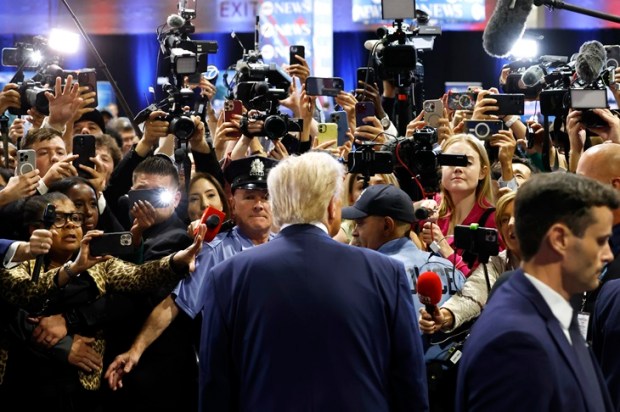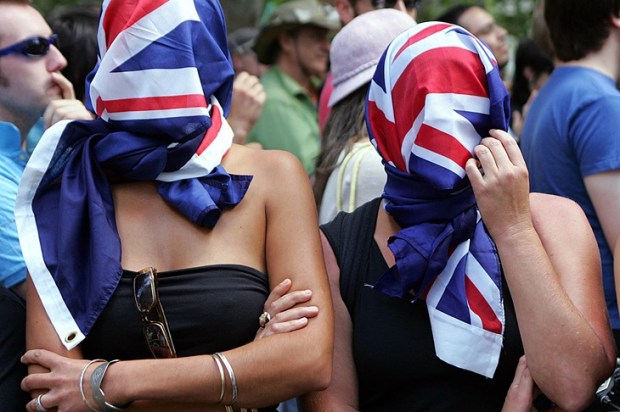A dilemma that has dogged conservatives since the emergence of so-called ‘woke’ progressive politics is how best to respond to it; whether to fight fire with fire or take the high road.
To illustrate, activists on the political left have for some time openly embraced ‘cancel culture’. One version of this is to seek to punish those who express ideas activists disapprove of – usually on topics such as race, gender, sexuality, or climate change – by seeking to get them fired by lodging protests with their employer.
But conservatives have had the chance to return serve throughout the US election campaign, which is in its final stages. The attempts to assassinate former President Donald Trump have resulted in some of his political opponents deplorably expressing regret that the gunmen have not been successful. Perhaps the most prominent example took place here in Australia when a member of the band, Tenacious D, joked at a concert after the first, very nearly successful, attempt on Trump’s life that he wished next time the shooter wouldn’t miss. A comment for which he later apologised.
Hateful and vitriolic comments have been directed at Trump for years by those in the media, political, and activist class, so much so it has become routine. But even in the heated and polarised atmosphere of modern politics, actively wishing death upon a political foe crosses a line. A line that, due to their deranged hatred of Trump, some jumped clear over.
And those foolish enough to express such views publicly quickly copped a dose of what all too many conservatives have experienced over recent years. Their social media posts would go viral, their identities would be exposed, and there were calls for their sacking. Tenacious D cancelled their tour due to the backlash, but cancel culture is not limited just to those with a large public profile. School employees, restaurant workers, a fire chief, and political aides have all lost their jobs.
Some conservatives were uncomfortable with these online lynchings. Maybe destroying the life of a humble hospitality worker, however deplorable their comments, makes conservatives just as bad as the left, and perhaps cancel culture should be resisted no matter who does it. But then the political left gets to engage in it with impunity, giving them a one-sided weapon to bludgeon opponents.
This situation is an example of what game theorists call ‘the prisoner’s dilemma’. This thought experiment, first developed in the 1950s, is according to influential intellectual Steven Pinker ‘one of the great ideas of the 20th Century, because it distils the tragedy of social life into such a succinct formula’.
The prisoner’s dilemma explores a hypothetical scenario involving two members of a criminal gang who are arrested and put in separate prison cells, unable to communicate. Based on the limited evidence the police have, if they each remain silent, the most they will get is one year in prison. But, if one ‘rats out’ the other, he will get off with no prison time, while the prisoner he testifies against will get three years in prison. If they both testify against each other, they will both get two years in prison.
This scenario illustrates how, if acting rationally, the two prisoners should cooperate and both keep their mouths shut, but a systemic challenge (in this case, the inability to communicate with each other) means that the suboptimal decision of each testifying against each other will likely be the path both prisoners choose. If a prisoner testifies, there is the chance the other will not and he will get off scot-free. But the risk of being the ‘sucker’ who stays silent whilst his fellow criminal sells him out means both prisoners are likely to choose to testify.
Pinker claims that ‘many of life’s predicaments have this structure, not least predatory violence, where being the aggressor against a pacifist provides all the benefits of exploitation’. Certainly, the same dynamics are at play in respect to cancel culture, and other negative features of the rise of woke progressivism like censorship, deplatforming, and the weaponisation of the legal system. Rationally, the left and the right should cooperate and agree that neither side will engage in these negative activities. But in the absence of cooperation, the benefits go to the aggressor.
Cooperation would still mean some downside for both sides (the equivalent to the one year in prison the two criminals will still get even if they choose the optimal path of both staying silent). In this case, the downside is the opposing side will get to communicate their ideas with complete impunity. But at least nobody gets cancelled, and each side gets to openly express themselves.
If instead, both sides engage in cancel culture, then both sides experience the stifling of free speech and live with the fear that something they say may destroy their lives. This is the equivalent to both criminals testifying against each other, resulting in two years in prison.
The third option is that one side engages in cancel culture and the other does not. This is like the ‘lucky’ prisoner who testifies while his partner in crime stays silent. The side that cancels its opponent not only gets to express themselves freely but silences the other side through fear and intimidation.
This is more or less how cancel culture has worked until recently. It has been a phenomenon only undertaken by one side, the political left, so their ideas – however crazy, extreme, insulting or bigoted – can be expressed freely, whilst the political right has suffered the chilling effect of being exposed to cancellation if they do the same.
But this has started to change. The boycott by conservatives in the United States of the brands Bud Light and Target, as a protest against their support for transgender activism, and in Australia the boycott of Woolworths to protest against that company’s attitude towards Australia Day, are examples of conservatives adopting measures usually embraced only by the other side.
The prisoner’s dilemma is useful for illustrating to conservatives how refusing to engage in cancel culture, however nobly intended, means they are cast in the role of ‘sucker’ – the equivalent of a criminal keeping silent while his partner in crime rats him out. But its usefulness as a tool to convince both sides to drop cancel culture and embrace free speech is limited. Our current cultural issues differ from the prisoner’s dilemma in important ways.
First, the prisoner’s dilemma assumes there is no cost in testifying against a partner in crime, or that such cost is equal to both prisoners. But in reality, different people might have greater moral or cultural taboos against testifying than others. The Mafia code of honour – Omerta – is an example. If one prisoner is subject to such a code that punishes cooperation with the police, their life may be impacted by testifying in other ways than simply the amount of jail time they must endure (such as social exclusion or more permanent acts of retribution). But if the other prisoner is not bound by such a code, they will be freer to testify.
Partaking in cancel culture sits uncomfortably with conservatives, whilst the woke left have no such reservations. Marxism, of which so much modern woke activism is an offshoot, actively preaches that ends justify means. If cancellation moves the cause of ‘progress’ forward, then it should be done. If, in a different context, free speech better advances social justice, then flipping 360 degrees and embracing free speech can be done without shame. In contrast, conservatives are more likely to live by the ‘neighbour principle’ of treating others how one would themselves like to be treated, and more likely to see free speech as a core principle whoever is exercising it, rather than something to be traded away when convenient.
Opinion polls confirm that conservatives take free speech more seriously than the left. A recent study of views towards free speech in the United States by FIRE (the Foundation for Individual Rights and Expression) found that over half of conservatives (53 per cent) thought that rights to free speech are ‘not at all secure’ whilst only one in ten liberals thought rights to free speech were not at all secure.
In the same vein, the prisoner’s dilemma assumes both prisoners value their freedom from incarceration equally. Applied to cancel culture, it would similarly assume that both sides value the benefit of free speech equally. As already mentioned, conservatives probably place a higher moral value on free speech than the left, but there are also more practical reasons why the left might value free speech less than the right.
Mutual free speech allows both sides to express their viewpoints, but it also exposes both sides to public critique and debate. Therefore, the side with the ideas that are most time tested, rational, and robust are likely to benefit from free speech the most, whereas the side whose ideas are most novel, based on emotion, and flimsy are, if anything, likely to be hostile to free speech.
The reality is that many ideas pushed by woke activists do not age well upon exposure to sunlight. Convincing people the solution to racism is to denigrate white people, or that men can get pregnant, or that feeding elite athletes a low protein vegan diet will save the planet (as was foisted upon competitors in the Paris Olympics) are all ideas whose proponents would much rather we be forced to blindly accept than debate.
The prisoner’s dilemma assumes that if both parties cooperate, they will receive the same modest one-year prison sentence. But in the culture wars, conservatives are much more likely to benefit from mutual free speech than the radical left. That is why woke activists spend so much energy on cancellation crusades.
Another difference is that, with the prisoner’s dilemma, the structural impediment to cooperation was the inability to communicate (the prisoners are deliberately isolated from each other). With the culture wars, there is no such impediment. Progressives and conservatives shout at each other incessantly on social media. In addition to the reasons already given – that conservatives treat free speech as a moral good in and of itself more so than the left, and also benefit from free speech more than the left – the reason for a failure of the left and right to cooperate and agree to mutual free speech is not a lack of communication. It is a lack of deterrence.
Game theory as an intellectual pursuit came of age during the Cold War nuclear arms race between the United States and the Soviet Union. These weapons were novel, so nobody quite knew how a decision maker in control of them might react in a crisis. Strategists used game theory to try to work out what should be done to ensure that nobody in charge of firing nuclear weapons ever felt it was a rational decision to use them. The theory the Cold War strategists came up with was MAD – mutually assured destruction. The best scenario was that both sides had so many nuclear weapons that could cause so much destruction, and the ability and willingness to use them in retaliation against an attack, that neither side would ever dare launch such an attack. Therefore, both sides made the optimal decision not to use their nuclear arsenals, motivated by fear of an annihilating nuclear war.
But for MAD to work, both sides needed these weapons and a willingness to use them in retaliation.
Early in the Cold War the United States had a nuclear monopoly and felt free to make threats to use them, perhaps most prominently in 1953 when President Dwight Eisenhower more or less threatened his communist foes with a nuclear attack unless they agreed to a ceasefire in the Korean War. This would not have worked a decade later when the Soviets had caught up with the United States in the nuclear arms race, by which time both sides were mutually deterred from making such threats.
To return to the dilemma of cancel culture, there will be minimal incentive for the woke left to choose the societally optimal course of mutual restraint from partaking in cancellation, censorship, deplatforming and the rest of the activist antics that have proven so destructive to free speech and civil society, unless there is a genuine risk of retaliation. As already discussed, the left does not value or benefit from free speech as much as conservatives. It might, sadly, be the case that the only way to convince both sides to respect free speech is to convey to the left that they will suffer the same consequences of cancel culture as they impose on the right. In this light, the boycotts of Bud Light and others, and the cancellation of those that wished Trump’s would-be assassin had shot straight are simply the actions necessary to establish mutual deterrence.
Critics might still argue however that this runs the risk of undermining the legitimacy of the conservative cause. If you stoop to the same level as your foe, what claim do you have to be any better? To answer that, there is one final difference between modern cancel culture and the prisoner’s dilemma.
In the prisoner’s dilemma, both prisoners have committed the same crime. But there is a false equivalence between the ‘crimes’ that woke activists seek to punish conservatives for through cancellation, compared to the ‘crimes’ they in turn are punished for. Although the media and other institutions seek to obscure it, there really is a difference between someone tripping up on the latest cultural taboo – things as trivial as failing to use correct pronouns – compared to publicly expressing the view that you would like someone dead.
To illustrate the double standard, in Australia earlier this year there was outrage when an employee of Officeworks refused service to a Jewish customer who wanted to laminate an article from the newspaper, Australian Jewish News, because the employee said, ‘I’m pro-Palestinian’. Calls to have the employee sacked were met with criticism on the left as conservative ‘pearl clutching’. But could anyone doubt that if the employee had refused service to a Muslim customer because they were ‘pro-Israel’ that the fury from the left would be far greater? If an employee refused service to any racial minority or member of the LGBT+ community in a similar way, being sacked would be the least of their problem: there would almost certainly be calls for them to be prosecuted for committing a hate crime. The same ‘crimes’ that conservatives are starting to demand be punished with sackings are the same ‘crimes’ that would likely result in violent rioting if the roles were reversed.
Conservatives do need to tread carefully. They do not want to become the same thing they have grown to despise: censorious, intolerant, scolds. But there is nothing illiberal, wrong, or ‘woke’ about holding people to account who refuse service to someone because they are Jewish or who openly declare they would like someone dead. As long as this does not descend into the same purity spiral that the woke left are in, where an increasingly pedantic list of topics are made taboo and must be punished if mentioned, such action by conservatives is a long overdue corrective.
Far too many politicians on the centre-right completely refuse to ‘lower’ themselves to fighting the culture wars. This is particularly the case in Australia at the state level, where Coalition oppositions (and not surprisingly, they are nearly all in opposition) seem to think it is beneath them to defend Western culture and values.
To use one more military analogy, a right-of-centre politician refusing to fight the culture wars is the same as Poland refusing to fight Germany in 1939. It does not matter what you want, your enemy is fighting a war anyway. You have the choice to either fight back or succumb.
The prisoner’s dilemma demonstrates the optimal outcome for society is mutual respect for free speech. But that is not the society we live in. This thought experiment also shows that the worst possible outcome for conservatives is to be in the position of the ‘sucker’, the prisoner who stays silent while his partner in crime rats him out. That is the situation conservatives currently find themselves. We live in a censorious culture, but at present the cancellation ratchet only turns one way.
Reversing this may feel uncomfortable for some. The alternative is much worse.
John Storey is the Director of Law and Policy at the Institute of Public Affairs and author of Big Wars – why do they happen and when will the next one be?

























